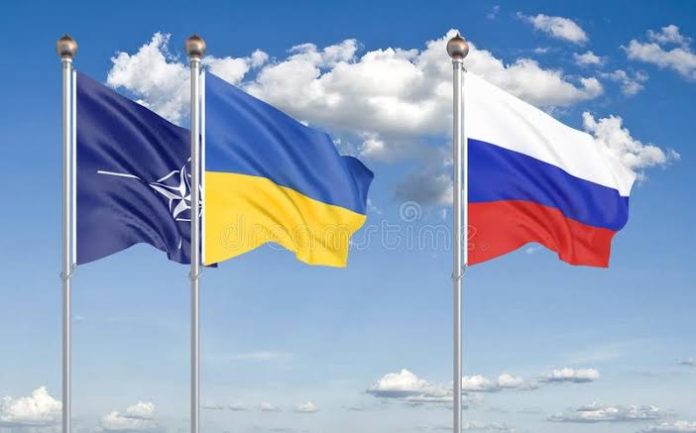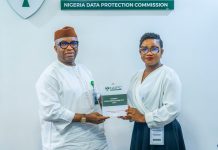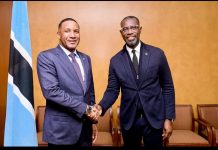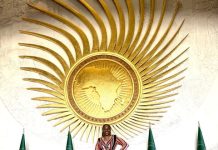The socio-political and religious information Africa consumes comes mainly from the West- America and its allies. And that is why Africans always echo western political views. We don‘t think for ourselves. We never ask- what is the other side of the story? We are neck-deep in Stockholm Syndrome, and we always believe the narrative of those who brutalized and enslaved us and plundered our resources for 400 years; and continue to do so.
So, for those of you who are interested in the other side of the story, here is my little contribution.
A couple of years before the dissolution of the Soviet Union, The Reagan administration asked Soviet leader Gorbachev to facilitate the reunification of Germany by tearing down the Berlin Wall. Gorbachev was assured by James Baker, Reagan‘s chief of staff and secretary of state under George Bush Snr., that NATO will not move an inch towards Russia if he took down the Berlin Wall. Gorbachev agreed and the Berlin Wall came tumbling down and East and West Germany were re-united. (This information can be found in the US National Defense Archives- declassified minutes of the Baker-Gorbachev discussion)
NATO honoured this agreement for 12 years- 8 years under George Bush Snr and 4 years under Bill Clinton. But in his second term, Bill Clinton and other NATO leaders threw the agreement into the dust bin. In 1996, a decision was taken to enlarge NATO and Poland, Czech Republic and Hungary were admitted into the alliance. This act signaled the inching towards Russia and marked the beginning of the second phase of hostilities between Russia and the West; and the kick-off of the new arms race. Before this time, Russia, after the dissolution of the Soviet Union, did not do anything in international politics to anger the US and its NATO allies. After the admission of the former Soviet states into NATO, an angry Boris Yeltsin made a speech where he told the US that Russia was not Haiti, and they cannot treat Russia like they have treated Haiti. He assured the West that Russia will come back.
The enlargement of NATO was followed a few years after by the bombardment of Russian allies without consulting Russia. NATO reigned supreme without any challenge from Russia.
Fast forward to year 2000. Vladimir Putin is elected Russian president. One of the first things he did was apply for Russia to join NATO. His reason was that NATO was created to counter the threat of the Warsaw Pact. But since the Warsaw Pact no longer existed, why not join the rest of Europe to work for a peaceful and more prosperous Europe. He asked for some sort of military partnership with NATO and the EU, but they basically told him no. They said Russia was too big to be part of the EU. But the real reason basically was that America did not want a major power challenging its authority in NATO.
In February 2007 at the G20 meeting, after NATO had announced plans to enlarge the alliance further towards Russia, Vladimir Putin made a speech and this is what he said-
“I think it is obvious that NATO expansion does not have any relation with the modernization of the alliance itself, or with ensuring security in Europe. On the contrary, it represents a serious provocation that reduces the level of mutual trust. And we have the right to ask- against whom is this expansion intended? And what happened to the assurance our western partners made after the dissolution of the Warsaw Pact? Where are those declarations today? No one remembers them. But I will allow myself to remind the audience what was said by NATO General Secretary Mr. Manfred Wörner in 1990-
“The fact that we are not ready to place a NATO army outside of German territory gives the Soviet Union a firm security guarantee”. Where are these guarantees, Putin asked the G20.
The NATO response was yes, you are right, but that was guarantees given to the Soviet Union, not Russia. That was a very dishonest and ingenious answer, and every right-thinking person knew it. It was like saying- yes, we made a promise to your father not to threaten his household but since he is dead, we are no longer bound by that promise.
In a later speech, Putin said that his suspicions about whether the US still pursues the secret policies of the Wolfowitz Strategy has been confirmed. (Wolfowitz Strategy, New York Times, 1992)
The Wolfowitz Strategy, which was developed by Paul Wolfowitz, Under Secretary of Defence, was a secret strategy by the US after the Cold War to make sure that no nation on earth attains enough power, either economic or military, to challenge US hegemony. It states that the US must remain the only superpower. It even goes further to insist that US allies must not develop their own nuclear capabilities but must leave that to the US to do it for them. The strategy also specifically mentioned Russia and insisted that the US must do everything in its power to make sure Russia does not become strong enough to challenge it.
When this report was leaked by the New York Times in 1992, there was outcry around the world. Many leaders decried it an as imperialist doctrine and the Bush (Snr)administration said that it had withdrawn that strategy. But US foreign policy since 1992 shows clearly that the Wolfowitz Strategy is still very much US foreign policy. Any country that is not a US ally that attempts to pull itself up militarily is invaded and destroyed.
That was what Putin meant when he said that his suspicions about the Wolfowitz Strategy has been confirmed. And since Putin made that speech, NATO and the US have inched closer and closer to Russia’s borders. And now they want Ukraine so that they can be 5 minutes away from striking at Russia.
In 1962, the Soviet Union and Cuba, in a joint military exercise, agreed to station missiles in Cuba. When the US found out, it threatened to sink the Soviet war ships and start World War 3 if the Soviet Union went ahead to station missiles in Cuba. Why? Because it was a threat to US security. You can’t have your enemy leaning over the wall of your neighbor’s house to aim a gun at your head. The US was right in saying no. But ironically, that is the same thing they want to do with Ukraine.
Since year 2000, NATO has inched closer and closer and now they are at Russia’s doorstep- Ukraine.
So, if you were the Russian president, what would you do?
Tyrone Biglion






